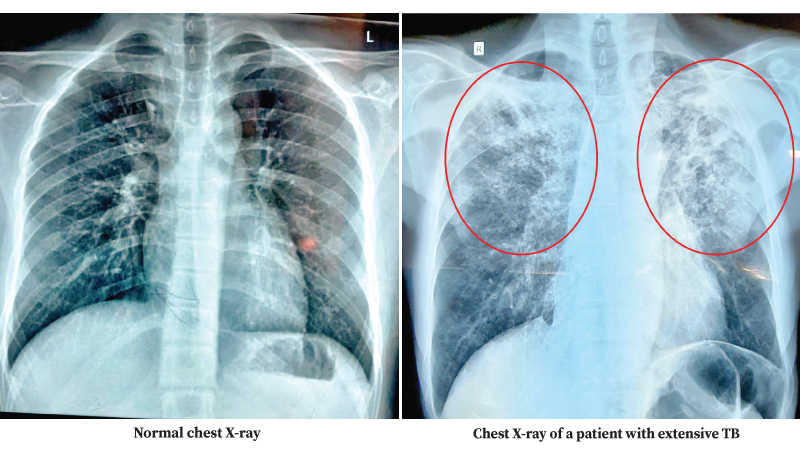 Tuberculosis (TB) has taken a sharp turn upwards in recent years both globally and in Sri Lanka, affecting a significant proportion of the population and leaving behind devastating consequences on the health, as well as the socio economic lives of the people.
Tuberculosis (TB) has taken a sharp turn upwards in recent years both globally and in Sri Lanka, affecting a significant proportion of the population and leaving behind devastating consequences on the health, as well as the socio economic lives of the people.
The Sunday Observer spoke to Senior Registrar and Respiratory Physician at the National Hospital for Respiratory diseases Welisara Dr. Nilanthi Gunathilaka to find out why the number of newly detected patients has increased in the recent months and how these numbers could be minimised in the near future with early detection , adherence to proper treatment procedures, living healthy lifestyles , refraining from smoking and alcohol and eating healthy nutritious food in patients with lowered immunity and advise potential cases on common symptoms to look out for .
Excerpts:
Q: Chest physicians across the world will observe World TB day today. For the benefit of our readers, what exactly is TB ?

Dr. Nilanthi Gunathilaka
A. Tuberculosis is an infectious disease that most often affects the lungs and is caused by a type of bacteria. About a quarter of the global population is estimated to have been infected with TB bacteria. Around 5-10% of people infected with TB will eventually get symptoms and develop TB disease. Globally, by the year 2022, 10.6 million people fell ill with TB and 1.3 million people died due to TB. In Sri Lanka, 25% of the population is infected with TB and each year 8000 people will develop the disease leading to 600 TB-related deaths in Sri Lanka. So the burden of this disease will have devastating impacts on the health, social, and economic status of this country . As it is the second most deadly infectious disease which is surpassed by the Covid-19 pandemic, we should make concerted efforts to end it..
Q: Does TB only affect the lungs?
A. TB bacteria affects almost all the body organs except your nails and hair. So, patients can develop headaches, fits (Seizures), and behaviour changes in those who develop TB meningitis. Young females may present with subfertility due to TB in their fallopian tubes. One might have TB in their digestive system, skin, urinary system and many more places in the body. Diagnosis of TB in those instances is quite complex.
Q: How is it transmitted? Through the air?
A. TB is an airborne infection. When a TB patient coughs, sneezes, laughs, or spits bacteria are expelled into the air in the form of droplets. These droplets form nuclei of droplets and remain suspended in the air for several hours. When a healthy person inhales these droplet nuclei containing the TB bacteria, he/ she may become infected.
Q: Are there any other modes of transmission?
A. There are various ways of transmission. For example, one might develop TB in their gut following ingestion of milk from a TB infected cow. A baby can develop congenital TB via placental transfer.
Q. Can one get it from a contaminated syringe?
A. No, TB is not a bloodborne disease such as hepatitis B & C or HIV
Q: Can anyone get TB? Age-wise and gender-wise, who are those most vulnerable to contract it? Why?
A. Theoretically yes anyone can get TB. During a lifetime a person may get infected with TB bacteria but 90 percent of the person’s body immune system is strong enough to combat against developing disease. But in around 10 percent of instances it will progress into TB.
People with low immunity, overcrowding, poor ventilation, and drug addiction are more vulnerable. In fact, young children especially those aged less than twelve months are the most vulnerable group to contact TB and TB-related catastrophic complications such as TB in the brain (TB meningitis).
TB related mortality rate is high among below five years age group. This is the reason we vaccinate the newborns with BCG vaccine soon after birth to ensure that children will not develop complicated TB in the lungs, TB meningitis, and disseminated TB. Sri Lankan men have more propensity to develop TB due to the risk behaviours such as substance use.
Old age is yet another risk category, especially for those who live in elderly homes.
Q: Are patients with pre-existing conditions more vulnerable to developing it?
A. Yes. People who have poor immunity due to diabetes, kidney disease, HIV infection, various cancers, alcohol abuse, and malnutrition are most likely to develop TB.
Q: What about those who habitually smoke cigarettes?
A. Definitely, smokers are more prone to develop a multitude of respiratory diseases including chronic obstructive pulmonary disease (COPD), lung cancers, TB, and many more.
Q: Drug addicts who also have low immunity – are they also more vulnerable to get TB?
A. Drug addiction has become a major risk factor to develop TB. The reasons why those groups of people develop TB are, malnutrition leading to poor immunity, living in crowded poorly ventilated areas, close contact with untreated TB patients and most importantly co-existing HIV infection. In fact, these people don’t seek treatment till they develop severe symptoms. Alarmingly we have come across a fair amount of youth at Welisara Chest Hospital who have encountered medical advice only after they developed extensive lung TB with respiratory failure resulting in death, despite the efforts of the doctors. If they had adhered to the initial treatment days and completed the total duration of treatment (that is six months or more, their lives would have been saved.
Q: Does genetics play a role? For instance, if a person has a family history of TB what are his/her chances of contracting the disease early?
A. Yes. If one family member has contracted the disease, other members of the same family and people breathing the same air are at greater risk of contracting TB.
Q: Are there early warning symptoms to look out for? If so, what are they?
A. If somebody has a persistent cough lasting more than two weeks, weight loss, fever, and night sweats it is highly suggestive of TB. They should seek medical advice from the nearest healthcare institution to check their phlegm and do a chest X-ray. Sometimes people with low immunity may not have the above four cardinal symptoms where a high degree of suspicion and advice from expertise is of utmost importance. Uncommon presentations of TB can be coughing out of blood, shortness of breath and chest pain while breathing.
Q: Can TB be cured if treated early?
A. Yes, it can be cured completely. The sooner the disease is identified, the sooner the patient gets cured. Early detection of TB, will leave less damage to the lungs. If the treatment is delayed it can result in even fatal consequences.
Q: What is the treatment procedure when a patient with suspicious symptoms walks into your clinic to be tested?
A. Once a patient encounters medical contact we evaluate their symptoms, perform the sputum testing for bacteria and rapid (gene x pert) testing for TB bacteria genetics. We perform sputum culture which is the gold standing test.
This takes around 8 weeks to get the culture results. For those who have detectable bacteria from the above tests, we treat them as sputum-positive TB patients. Some patients will not be able to produce adequate phlegm or TB bacteria not detectable from the tests.
Still, the doctor can start treatment if the TB diagnosis is confirmed depending on clinical features and chest X-ray or CT findings. We categorise these patients as sputum negative TB.
We also discuss with the patient and relatives about the disease and treatment. For a first-time diagnosed patient, six months of uninterrupted treatment is essential. For the first two months we embark on treatment with four-drug combinations and in the last four months we give two-drug combined treatment.
Now all the drugs are in one tablet and easy to swallow. TB involves the body extensively, sometimes requiring treatment for up to one year. Unless they complete the course fully the patient will not be cured complexly and could lead to emergence of drug-resistant bacteria as well.
All the standard tests and TB drugs are available in government hospitals and they are provided free of charge to the patients. All the treatment is provided from district chest clinics in each district. So If you develop vomiting, abdomen pain, skin rashes, or any side effect due to drugs, meet your doctor. We monitor your blood tests and treat any side effects to the drugs.
Q: Once cured, can the patients contract the disease again? If so, how soon after his/her treatment? Days/ Weeks? Months?
A. Recurrent TB can be developed in some of the patients who have even completed or cured with TB drugs. The exact duration of this reappearance of disease cannot be explained and it depends on the patient’s immunity. Those who have low immunity may develop a relapse of the disease and sometimes drug-resistant TB as well.
Q: Has TB been eradicated from Sri Lanka?
A. TB has not been eliminated either in Sri Lanka or the whole world yet and we are all still trying to achieve that goal. Hence the Health Ministry is currently giving priority to reducing the number of new TB cases by the year 2035. Sri Lanka has a dedicated team of health focusing on this target and we may have all the capacity if we make collective efforts.
Q: The theme for World TB Day this year is Invest more to end TB. How far are you in reaching this goal? What are the obstacles that prevent you from realising those goals?
A. Lack of awareness among the population, late presentation to medical service, economic crisis in the country hampering the nutrition status, poor immunity due to various diseases, poor housing conditions, drug addiction and HIV co-infection are the major barriers.
Q: What gaps do you see in delivering quality care for all TB patients in Sri Lanka equitably?
A. WHO estimates 14,000 new TB cases to be detected per year in Sri Lanka. But only 8,000 cases are detected per annum.
Q: How would you like to fill those gaps?
A. This gap of diagnosis is due to lack of awareness among society on the symptoms, Amid the economic crisis people are malnourished and not spending money on seeking health advice. So it’s necessary that we make an effort to improve their quality of life with adequate nutrition and good housing conditions.
Q: Do you have a message to all persons who are vulnerable to TB risks and who have also contracted the disease?
A. If somebody has TB suggestive symptoms, be punctual enough to seek medical advice from the nearest hospital. Make sure that your doctor has excluded TB with adequate tests. If you become TB positive, thoroughly adhere to the treatment regime, follow proper sputum disposal etiquette, live in a well aerated environment, wear face mask properly during encounters to others and screen your close contacts who have symptoms more than 2 weeks. To boost your immunity, make sure to follow healthy eating, behavioural modifications, get your diabetes or other diseases controlled. Last but not the least, keep in your mind that it is all our responsibility to make our country free of tuberculosis.




